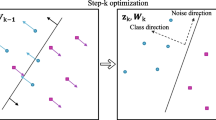Abstract
Zero-shot learning (ZSL) is concerned with the recognition of previously unseen classes. It relies on additional semantic knowledge for which a mapping can be learned with training examples of seen classes. While classical ZSL considers the recognition performance on unseen classes only, generalized zero-shot learning (GZSL) aims at maximizing performance on both seen and unseen classes. In this paper, we propose a new process for training and evaluation in the GZSL setting; this process addresses the gap in performance between samples from unseen and seen classes by penalizing the latter, and enables to select hyper-parameters well-suited to the GZSL task. It can be applied to any existing ZSL approach and leads to a significant performance boost: the experimental evaluation shows that GZSL performance, averaged over eight state-of-the-art methods, is improved from 28.5 to 42.2 on CUB and from 28.2 to 57.1 on AwA2.
The supplementary material is available at https://arxiv.org/pdf/1809.10120.pdf
Access this chapter
Tax calculation will be finalised at checkout
Purchases are for personal use only
Similar content being viewed by others
References
Akata, Z., Perronnin, F., Harchaoui, Z., Schmid, C.: Label-embedding for image classification. IEEE Trans. Pattern Anal. Mach. Intell. 38(7), 1425–1438 (2016)
Akata, Z., Reed, S., Walter, D., Lee, H., Schiele, B.: Evaluation of output embeddings for fine-grained image classification. In: Proceedings of the CVPR 2015, pp. 2927–2936. IEEE (2015)
Bishop, C.M.: Pattern Recognition and Machine Learning. Springer, New York (2006)
Bucher, M., Herbin, S., Jurie, F.: Generating visual representations for zero-shot classification. In: ICCV Workshops: TASK-CV. IEEE (2017)
Changpinyo, S., Chao, W.L., Gong, B., Sha, F.: Synthesized classifiers for zero-shot learning. In: Proceedings of the CVPR 2016, pp. 5327–5336. IEEE (2016)
Chao, W.-L., Changpinyo, S., Gong, B., Sha, F.: An empirical study and analysis of generalized zero-shot learning for object recognition in the wild. In: Leibe, B., Matas, J., Sebe, N., Welling, M. (eds.) ECCV 2016. LNCS, vol. 9906, pp. 52–68. Springer, Cham (2016). https://doi.org/10.1007/978-3-319-46475-6_4
Deng, J., Dong, W., Socher, R., Li, L.J., Li, K., Fei-Fei, L.: ImageNet: a large-scale hierarchical image database. In: Proceedings of the CVPR 2009, pp. 248–255. IEEE (2009)
Frome, A., et al.: Devise: a deep visual-semantic embedding model. In: Proceedings of the NIPS 2013, pp. 2121–2129 (2013)
Fu, Y., Hospedales, T.M., Xiang, T., Gong, S.: Transductive multi-view zero-shot learning. IEEE Trans. Pattern Anal. Mach. Intell. 37(11), 2332–2345 (2015)
He, K., Zhang, X., Ren, S., Sun, J.: Deep residual learning for image recognition. In: Proceedings of the CVPR 2016, pp. 770–778. IEEE (2016)
Kodirov, E., Xiang, T., Fu, Z., Gong, S.: Unsupervised domain adaptation for zero-shot learning. In: Proceedings of the CVPR 2015, pp. 2452–2460. IEEE (2015)
Kodirov, E., Xiang, T., Gong, S.: Semantic autoencoder for zero-shot learning. In: Proceedings of the CVPR 2017, pp. 4447–4456. IEEE (2017)
Kumar Verma, V., Arora, G., Mishra, A., Rai, P.: Generalized zero-shot learning via synthesized examples. In: Proceedings of the CVPR 2010, pp. 4281–4289. IEEE (2018)
Lampert, C.H., Nickisch, H., Harmeling, S.: Learning to detect unseen object classes by between-class attribute transfer. In: Proceedings of the CVPR 2009, pp. 951–958. IEEE (2009)
Lampert, C.H., Nickisch, H., Harmeling, S.: Attribute-based classification for zero-shot visual object categorization. IEEE Trans. Pattern Anal. Mach. Intell. 36(3), 453–465 (2014)
Larochelle, H., Erhan, D., Bengio, Y.: Zero-data learning of new tasks. In: AAAI, vol. 1, p. 3 (2008)
Palatucci, M., Pomerleau, D., Hinton, G.E., Mitchell, T.M.: Zero-shot learning with semantic output codes. In: Proceedings of the NIPS 2009, pp. 1410–1418 (2009)
Radovanović, M., Nanopoulos, A., Ivanović, M.: Hubs in space: popular nearest neighbors in high-dimensional data. J. Mach. Learn. Res. 11, 2487–2531 (2010)
Rohrbach, M., Ebert, S., Schiele, B.: Transfer learning in a transductive setting. In: Proceedings of the NIPS 2013, pp. 46–54 (2013)
Romera-Paredes, B., Torr, P.: An embarrassingly simple approach to zero-shot learning. In: Proceedings of the ICML 2015, pp. 2152–2161 (2015)
Shigeto, Y., Suzuki, I., Hara, K., Shimbo, M., Matsumoto, Y.: Ridge regression, hubness, and zero-shot learning. In: Appice, A., Rodrigues, P.P., Santos Costa, V., Soares, C., Gama, J., Jorge, A. (eds.) ECML PKDD 2015. LNCS (LNAI), vol. 9284, pp. 135–151. Springer, Cham (2015). https://doi.org/10.1007/978-3-319-23528-8_9
Szegedy, C., et al.: Going deeper with convolutions. In: Proceedings of the CVPR 2015, pp. 1–9. IEEE (2015)
Wah, C., Branson, S., Welinder, P., Perona, P., Belongie, S.: The Caltech-UCSD Birds-200-2011 dataset (2011)
van Wieringen, W.N.: Lecture notes on ridge regression. arXiv preprint arXiv:1509.09169 (2015)
Xian, Y., Lampert, C.H., Schiele, B., Akata, Z.: Zero-shot learning - a comprehensive evaluation of the good, the bad and the ugly. arXiv preprint arXiv:1707.00600 (2017)
Xian, Y., Lorenz, T., Schiele, B., Akata, Z.: Feature generating networks for zero-shot learning. In: Proceedings of the CVPR 2018. IEEE (2018)
Xian, Y., Schiele, B., Akata, Z.: Zero-shot learning - the good, the bad and the ugly. In: Proceedings of the CVPR 2017, pp. 3077–3086. IEEE (2017)
Author information
Authors and Affiliations
Corresponding author
Editor information
Editors and Affiliations
Rights and permissions
Copyright information
© 2019 Springer Nature Switzerland AG
About this paper
Cite this paper
Le Cacheux, Y., Le Borgne, H., Crucianu, M. (2019). From Classical to Generalized Zero-Shot Learning: A Simple Adaptation Process. In: Kompatsiaris, I., Huet, B., Mezaris, V., Gurrin, C., Cheng, WH., Vrochidis, S. (eds) MultiMedia Modeling. MMM 2019. Lecture Notes in Computer Science(), vol 11296. Springer, Cham. https://doi.org/10.1007/978-3-030-05716-9_38
Download citation
DOI: https://doi.org/10.1007/978-3-030-05716-9_38
Published:
Publisher Name: Springer, Cham
Print ISBN: 978-3-030-05715-2
Online ISBN: 978-3-030-05716-9
eBook Packages: Computer ScienceComputer Science (R0)




